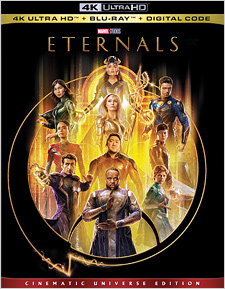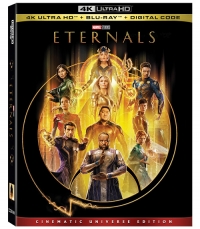Also today, Shout! and Scream Factory have begun revealing the first titles from their March 2022 slate, which is currently set to include A Writer’s Odyssey (Blu-ray and DVD) on 3/8, Albert Pyun’s The Sword and the Sorcerer: Collector’s Edition (1982 – 4K UHD/Blu-ray Combo), Signal (Blu-ray, and the Nightmare: Collector’s Edition (BD) on 3/15, and The Core: Shout Select (Blu-ray), Millennium Actress (Blu-ray Steelbook), and A Tale of Two Guns (Blu-ray and DVD) on 3/22.
And Lionsgate has set Power Book III: Raising Kanan: The Complete First Season for DVD release on 2/1.
In other news today, The Hollywood Reporter has posted a great new interview with Robert Rodriguez about his work on the forthcoming Star Wars: The Book of Boba Fett streaming series, which debuts on Disney+ on 12/29. It’s a lengthy piece with plenty of insights, so is definitely worth your time if you’re a Star Wars fan. You’ll find that here.
Also worth your time today is this new video discussion between filmmakers James Cameron and Denis Villeneuve on YouTube in which they discuss Dune and the forthcoming Avatar sequels. Think of it as two science fiction/movie geeks, geeking out about science fiction and movies. It’s a fascinating and entertaining discussion and appears online courtesy of Variety. Trust me when I say that it’s 30 minutes well spent. Here’s that...
Finally today, I wanted to share a thread on Twitter that’s worth a look for 4K Ultra HD enthusiasts. Cinematographer Steve Yedlin (Looper, The Last Jedi, Knives Out) was talking about the forthcoming new 4K release of Looper the other day, and in the back and forth that inevitably followed a 4K enthusiast asked: “Did they scan the negative or just upscale the 2K master because of the visual effects?” Yedlin’s response was illuminating and something that 4K enthusiasts should take to heart:
“1. Why assume it’s one or the other for the whole movie rather than shot to shot?
2. Who cares. Even a 2K cinema master is way higher quality than any consumer format so if a new consumer format can get closer to that by using a higher data rate, who cares about nominal k-count?”
He later added that to have answered the original question as phrased would have been to “reinforce the implied premises.”
And this is worth mentioning here, because it’s something I hear a lot from well-meaning fans of 4K Ultra HD, who have a tendency to throw around terms like “fake 4K” and “fake HDR” as if they have any real meaning, or as if simple pixel counts and nits are all that matters with a 4K Ultra HD release. What actually matters is the quality of the pixels captured during the filmmaking process—whether analog or digital—and preserving as much of that quality as possible in the final home video presentation, whether on Blu-ray, 4K Ultra HD, or what have you. What’s more, HDR is simply a tool that each filmmaker approaches differently. Some like to be more restrained, some try to achieve a hotter or more high contrast look, some even darken the image a bit (Villeneuve’s Arrival on 4K UHD is a good example). These things must be taken into account when evaluating a 4K image.
Often when we review a catalog film on 4K here at The Bits, we’ll note that a well done process of remastering for the format typically involves the restoration team (and the filmmakers themselves if they’re still alive), going through the film shot by shot. Some VFX heavy shots are upsampled, some are rescanned from original negative (or sourced from original RAW files) and dropped in where it makes sense, and the whole thing is carefully checked to make sure that the highest image quality possible is achieved. Then it’s obviously graded for HDR, encoded, and prepared for release on disc. And we know this is true because we talk with people who do exactly this kind of work regularly. Certainly every film is different, and every remastering budget is different—some films get more love and attention in remastering than others because the studio considers them more valuable or more important.
But this idea that some 4K fans seem to have that studios simply take a 2K Digital Intermediate and wholesale upscale it for 4K, slap HDR on it, and release it on disc is misguided. The work is typically a more involved and careful than that. And at the end of the day, as Yedlin notes, what matters more is that you’re still getting the added benefit of greater color bit-depth, HDR, and higher data rates as well.
Anyway, I thought that was worth sharing. It’s worth adding that nobody I know of has done more in-depth work on the topic of image science as it relates to cinematic imagery on photochemical film and digital than Steve Yedlin. If you’ve experienced the terrific special features on Lionsgate’s Knives Out 4K release (including Making a Murder – Visual Clues: Cinematography)—all of which were produced by our old friend Cliff Stephenson—then you’ll understand what I’m talking about. In fact, Yedlin’s got a fantastic website that I can’t recommend more highly to film and A/V enthusiasts: Yedlin.net. There you will find elaborate film and digital capture comparisons, resolution and display prep demos, and all kinds of other technical information on color science and the like. The site is a rich treasure trove of information for 4K enthusiasts and I strongly encourage you all to check it out.
All right, we’ll leave you with a look at the cover artwork for The Eternals (both formats) along with Scream’s The Sword and the Sorcerer. We’ll add the Amazon.com pre-order links as soon as they go live...



And that’s all for today. Don’t forget that there are new episodes of Hawkeye and The Expanse: Season 6 up on Disney+ and Amazon respectively. Amazon also has a 40-minute look behind the scenes at William Shatner’s recent trip to space, as well as the latest episode of Wheel of Time, and the final season of Lost in Space is up on Netflix. I also strongly recommend the animated Arcane: League of Legends on Netflix was well. It’s one of the best things I’ve seen all year and worth checking out.
Have a great weekend everyone!
(You can follow Bill on social media at these links: Twitter and Facebook)






